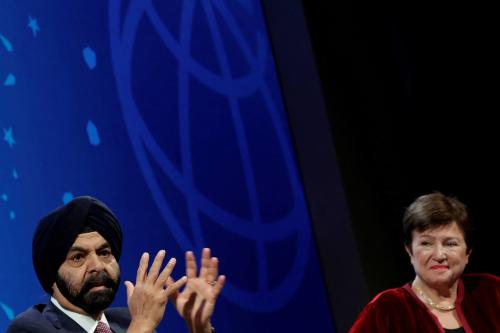If the U.S. Congress cannot act to increase the debt limit before this Thursday, the U.S. Treasury’s ability to manage its cash would be severely strained and could lead to delays of payments and possibly a default.
At this weekend’s IMF-World Bank Annual Meetings, many leaders from all corners of the globe appealed to the United States government to raise its debt ceiling. The African governors in their Communique expressed their worry about the “threat of potentially devastating budgetary challenges in the U.S. which if left unaddressed could derail the fragile recovery.”
Recall that in August 2011, Standard & Poor’s downgraded for the first time the AAA credit rating the U.S. had held for 70 years. The agency cited its concerns about the weakening of “the effectiveness, stability, and predictability of American policymaking and political institutions at a time of ongoing fiscal and economic challenges.” As a result, U.S. equity markets fell by 20 percent and between the second and third quarter of 2011, household wealth fell $2.4 trillion (according to a U.S. Treasury report).
According to the US Treasury a default would be “unprecedented and has the potential to be catastrophic: credit markets could freeze, the value of the dollar could plummet, U.S. interest rates could skyrocket, the negative spillovers could reverberate around the world, and there might be a financial crisis and recession that could echo the events of 2008 or worse.”
It is very difficult to disagree with such an assessment given the role that U.S. government securities play in the highly integrated world of global finance. Each of the variables identified by the U.S. Treasury report is a channel of spillover to global markets. Global investors need a “risk-free” benchmark to value securities and U.S. Treasuries typically play this role (given that the U.S. still holds a solid credit rating and the fact that it has never defaulted). Emerging and developing countries that issue dollar-denominated bonds could pay a higher price should the U.S. default. Furthermore, the U.S. Treasury market is perhaps the deepest and most liquid market in the world, allowing investors to exchange U.S. Treasuries for cash very rapidly even in in times of market stress.
The relative safety of U.S. Treasuries coupled with their liquidity has made them a cornerstone of global financial markets.
The relative safety of U.S. Treasuries coupled with their liquidity has made them a cornerstone of global financial markets. Many institutional investors who face constraints in their investment policy rely on U.S. Treasuries because of their high rating. Treasuries are heavily used as collateral in repurchase agreements (repos) and they constitute the largest share of central banks’ international reserves. Latest IMF data indicate that dollar securities amount to $3.8 trillion or 62 percent of central banks’ reported international reserves compared to $1.4trillion or 24 percent of total for euro-denominated instruments.
Given the dire consequences of a U.S. default on the global economy, it appears that global investors are so far assigning a small probability of such an event (judging by the behavior of U.S. Treasury yields and U.S. Sovereign CDS spreads). Credit rating agencies seem to agree with market participants and have not taken any rating action so far. After all, the U.S. is still an engine of global growth and, among advanced countries, it has shown the clearest signs of recovery so far. Using the analogy of game theory, a U.S. default appears to be a possible outcome to which players are assigning a small probability of occurrence. But this is a very dangerous game as it has repercussions both within and outside the U.S., with potential short-term costs and long-term costs.
If there is no default, then the long-term consequences of U.S. political brinkmanship should be carefully assessed. In spite of calls to reduce the dependence on U.S. Treasuries, diversifying international reserves away from U.S. dollar assets will be a slow moving process, simply because there are few alternatives at the moment. China and Japan still hold $1.3 and $1.1 trillion in U.S. Treasuries respectively, and U.S. dollar denominated assets are still as important as they were in the past (62 percent now in comparison to 59 percent of international reserves in 1995).
There is also one other lesson for the rest of the world is from the ongoing U.S. debt ceiling debate: global interdependence calls for stronger cooperation. Discussions about political brinkmanship in the U.S. provide strong ammunition for countries, such as the BRICS (Brazil, Russia, India, China, and South Africa) and African countries, asking for governance reforms in international financial institutions like the IMF and World Bank.



Commentary
Op-edThe U.S. Debt Ceiling Impasse and Consequences for the Global Economy
October 15, 2013